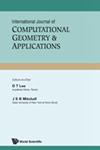Declutter and Resample: Towards Parameter Free Denoising
Q4 Mathematics
International Journal of Computational Geometry & Applications
Pub Date : 2015-11-17
DOI:10.4230/LIPIcs.SoCG.2017.23
引用次数: 15
Abstract
In many data analysis applications the following scenario is commonplace: we are given a point set that is supposed to sample a hidden ground truth K in a metric space, but it got corrupted with noise so that some of the data points lie far away from K creating outliers also termed as ambient noise. One of the main goals of denoising algorithms is to eliminate such noise so that the curated data lie within a bounded Hausdorff distance of K. Popular denoising approaches such as deconvolution and thresholding often require the user to set several parameters and/or to choose an appropriate noise model while guaranteeing only asymptotic convergence. Our goal is to lighten this burden as much as possible while ensuring theoretical guarantees in all cases. Specifically, first, we propose a simple denoising algorithm that requires only a single parameter but provides a theoretical guarantee on the quality of the output on general input points. We argue that this single parameter cannot be avoided. We next present a simple algorithm that avoids even this parameter by paying for it with a slight strengthening of the sampling condition on the input points which is not unrealistic. We also provide some preliminary empirical evidence that our algorithms are effective in practice.去噪和采样:走向无参数去噪
在许多数据分析应用程序中,以下场景是常见的:我们给定一个点集,该点集应该在度量空间中对隐藏的基础真理K进行采样,但它被噪声破坏了,因此一些数据点远离K,产生了异常值,也称为环境噪声。去噪算法的主要目标之一是消除这些噪声,使整理的数据位于k的有界豪斯多夫距离内。流行的去噪方法,如反卷积和阈值化,通常需要用户设置几个参数和/或选择合适的噪声模型,同时只保证渐近收敛。我们的目标是尽可能减轻这一负担,同时在所有情况下确保理论上的保证。具体来说,首先,我们提出了一种简单的去噪算法,它只需要一个参数,但在一般输入点上提供了输出质量的理论保证。我们认为这个参数是无法避免的。接下来,我们提出一个简单的算法,通过稍微加强输入点的采样条件来避免这个参数,这不是不现实的。我们还提供了一些初步的经验证据,表明我们的算法在实践中是有效的。
本文章由计算机程序翻译,如有差异,请以英文原文为准。
求助全文
约1分钟内获得全文
求助全文
来源期刊
CiteScore
0.80
自引率
0.00%
发文量
4
审稿时长
>12 weeks
期刊介绍:
The International Journal of Computational Geometry & Applications (IJCGA) is a quarterly journal devoted to the field of computational geometry within the framework of design and analysis of algorithms.
Emphasis is placed on the computational aspects of geometric problems that arise in various fields of science and engineering including computer-aided geometry design (CAGD), computer graphics, constructive solid geometry (CSG), operations research, pattern recognition, robotics, solid modelling, VLSI routing/layout, and others. Research contributions ranging from theoretical results in algorithm design — sequential or parallel, probabilistic or randomized algorithms — to applications in the above-mentioned areas are welcome. Research findings or experiences in the implementations of geometric algorithms, such as numerical stability, and papers with a geometric flavour related to algorithms or the application areas of computational geometry are also welcome.

 求助内容:
求助内容: 应助结果提醒方式:
应助结果提醒方式:


